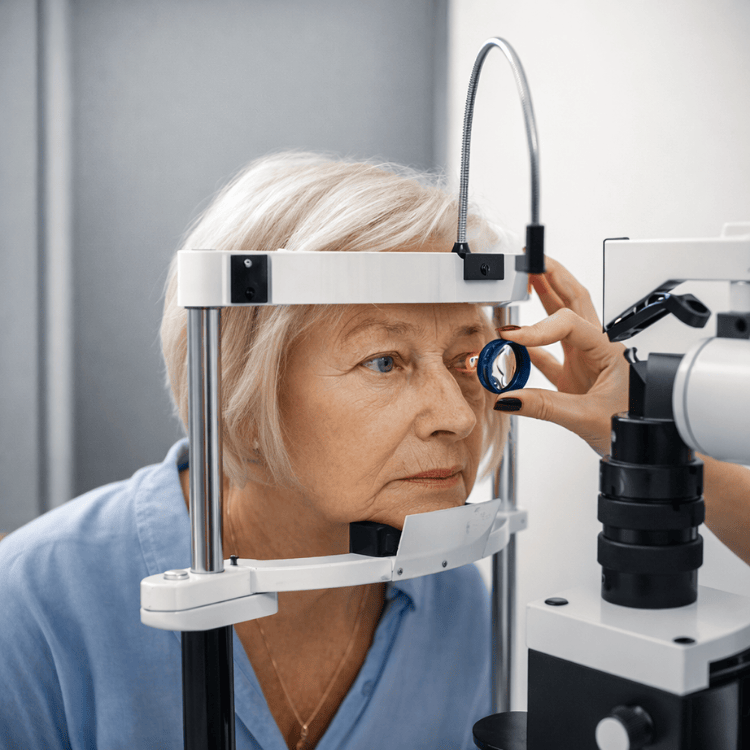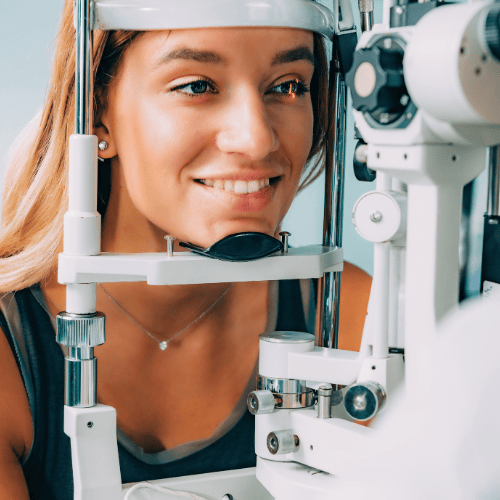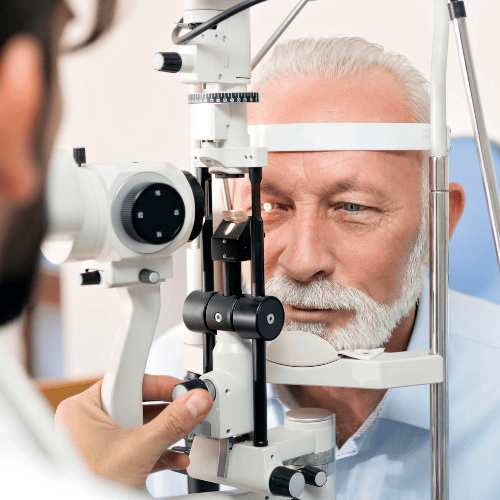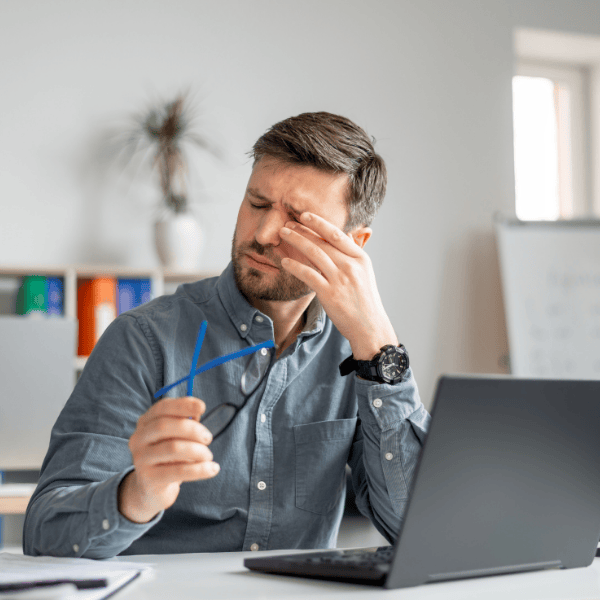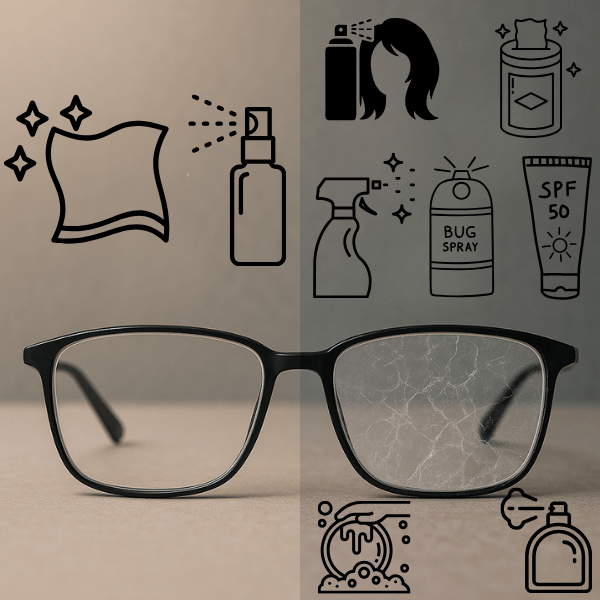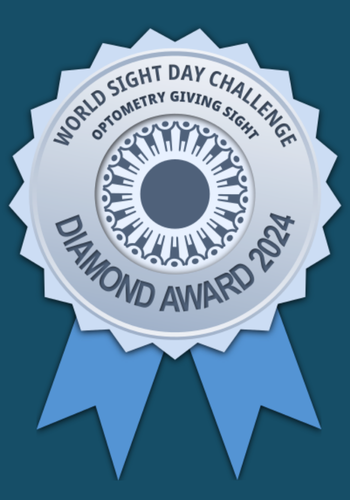THE EFFECT OF STRESS ON OUR EYES
In today’s fast-paced and demanding world, stress has become a constant companion for many of us. From work pressure to personal responsibilities, stress can take a toll on our physical and mental well-being. One area that is often affected by stress is our visual system. In this newsletter article, we will explore the effects of stress on our eyes and discuss ways to mitigate its impact.
Stress is a natural response to challenging situations, and in small doses, it can actually be beneficial. It can motivate us to perform better and overcome obstacles. However, chronic or excessive stress can lead to a range of health problems, including eye-related issues.
One of the most common eye conditions associated with stress is eye strain. When we are stressed, our bodies tend to tense up, including the muscles around our eyes. This prolonged tension can cause discomfort, headaches, dryness, eyelid muscle twitching, and aching around the eyes. Eye strain can also result from prolonged use of digital devices like computers, smartphones, and tablets.
Moreover, excessive stress can disrupt our sleep patterns, leading to chronic fatigue. Lack of quality sleep can further exacerbate eye strain and make our eyes more susceptible to other eye conditions, such as dry eyes and blurry vision.
Another way stress affects our eyes is by compromising our immune system. When we are stressed, our body releases stress hormones that can weaken the immune system’s ability to fight off infections and inflammation. This can increase the risk of developing certain eye infections, such as conjunctivitis (pinkeye) or styes.
Most people are aware that health conditions like high blood pressure are often worsened by chronic stress. Few are aware of the potential effects of high blood pressure on the delicate blood vessels in the retina (tissue that lines the back of the eyes). When these vessels become compromised, they may leak and cause permanent retinal damage and potentially vision loss.
Finally, a condition known as “Central Serous Retinopathy” (CSO) may develop in certain individuals exposed to acute levels of stress. With this condition, small, localized retinal detachments may occur in the part of the eye that processes sharp, detailed central vision. Often CSO resolves on its own without consequence, however, sometimes there may be tissue damage leading to scarring and a degree of permanent loss of clarity.
So, how can we protect our eyes from the harmful effects of stress? Here are a few strategies to consider:
1. Practice stress management techniques: Incorporate stress reduction techniques into your daily routine. Deep breathing exercises, meditation, yoga, and regular physical activity can help alleviate stress levels and promote overall well-being.
2. Take regular breaks from digital devices: If your work or lifestyle involves prolonged use of digital devices, make it a point to take regular breaks. Follow the 20-20-20 rule – every 20 minutes, take a 20-second break and focus on something 20 feet away. Ensure proper blinking during digital device use. This can help reduce eye strain and prevent dryness.
3. Prioritize quality sleep: Establish a consistent sleep routine and aim for 7-9 hours of uninterrupted sleep each night. Create a relaxing bedtime routine, avoid screen time before bed, and ensure your sleeping environment is conducive to restful sleep.
4. Use proper ergonomics: When using digital devices or working on a computer, ensure proper ergonomics. Position your monitor at eye level, maintain a comfortable distance from the screen, and use proper lighting to reduce eye strain. Your MVO optometrist can give you more specific advice on this at your next eye exam appointment.
5. Stay hydrated: Drinking an adequate amount of water throughout the day can help prevent dry eyes. Aim for at least 8 glasses of water per day to keep your eyes moisturized. Avoid excessive amounts of caffeine which is known to contribute to higher levels of anxiety and due to its diuretic effect, may also contribute to dry eyes.
6. Visit your MVO optometrist. Schedule regular annual eye exams. We can detect early signs of eye conditions related to stress and provide appropriate treatment or management strategies.
In conclusion, stress can have a significant impact on our eyes, increasing our risk for a variety of conditions affecting our vision. By adopting stress management techniques, taking breaks from screens, prioritizing quality sleep, practicing proper ergonomics, staying hydrated, and seeking regular eye care, we can protect our eyes and minimize the effects of stress.
Remember, it is crucial to prioritize self-care and work on managing excessive levels of stress for the sake of our vision and our overall health and well-being.
Source: https://www.optometrytimes.com/view/stress-can-lead-to-negative-effects-in-the-eye




